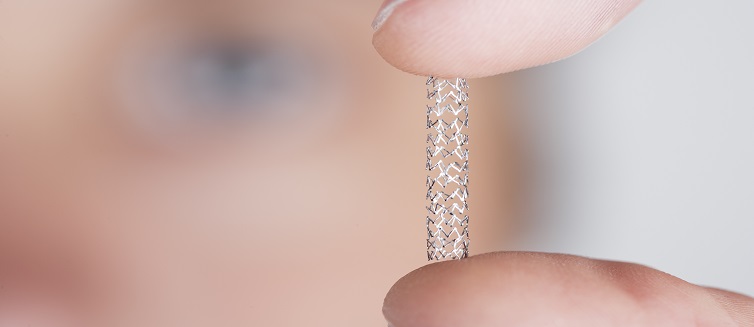A stent is a tiny wire mesh tube that holds an artery, blood vessel, or duct open to provide better blood flow for your heart.
Learn more about services at the UPMC Heart and Vascular Institute.
Never Miss a Beat!
Subscribe to Our HealthBeat Newsletter!
Thank you for subscribing!
You can now select the specific newsletters you'd like to receive.
You are already subscribed.
Subscribe to more newsletters in our email preference center.
Sorry, an error occurred. Please try again later.
Get Healthy Tips Sent to Your Phone!
Why Is a Stent Used for Cardiovascular Care?
When a coronary artery is clogged, it can reduce blood flow to the heart which can cause injury to the heart muscle and symptoms such as chest pain. When a coronary artery becomes completely blocked, it prevents blood flow to the heart and can result in a heart attack.
Stents are used to help increase blood flow in blocked coronary arteries to decrease damage to the heart.
What Happens When I Get a Stent?
According to the American Heart Association, doctors might perform a percutaneous coronary intervention (PCI), also known as a coronary angioplasty if there is significant arterial blockage.
This procedure involves inserting a balloon-tipped catheter into the artery. When the catheter reaches the blockage, the balloon is inflated to compress the plaque and open the artery to increased blood flow. If the artery is successfully opened, the balloon is deflated and the catheter is removed.
If a stent is needed, the stent is placed around the balloon catheter. When the balloon expands at the blockage, the stent expands and locks into place, forming a backbone for the previously blocked artery. A stent stays in place permanently.
According to the National Heart, Lung and Blood Institute, after a coronary stent procedure, you will need antiplatelet therapy, such as taking aspirin, to keep blood clots from forming in the stent.
What Are the Advantages of a Stent for the Heart?
A stent increases blood flow to the heart muscle, potentially decreasing the risk of heart attack. If someone is having a heart attack, stents placed quickly enough can decrease the damage done to the heart muscle.
About Heart and Vascular Institute
The UPMC Heart and Vascular Institute has long been a leader in cardiovascular care, with a rich history in clinical research and innovation. As one of the first heart transplant centers in the country and as the developer of one of the first heart-assist devices, UPMC has contributed to advancing the field of cardiovascular medicine. We strive to provide the most advanced, cutting-edge care for our patients, treating both common and complex conditions. We also offer services that seek to improve the health of our communities, including heart screenings, free clinics, and heart health education. Find an expert near you.
